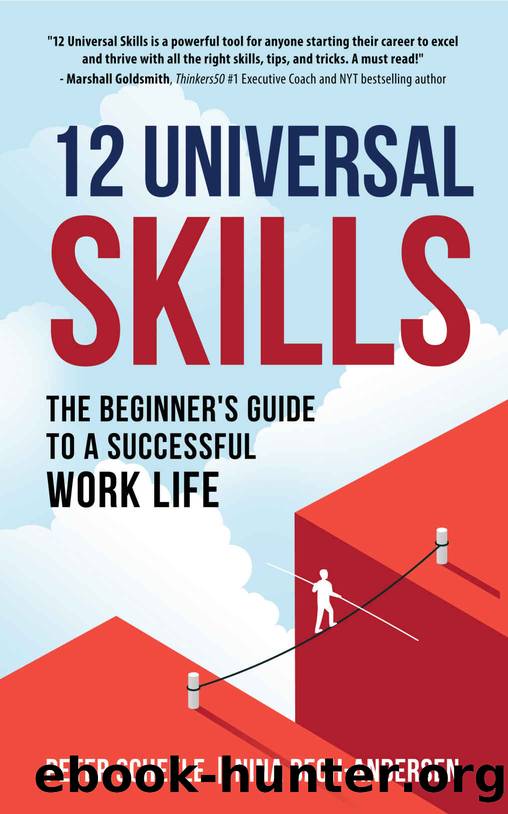12 Universal Skills by Scheele Peter & Bech-Andersen Nina

Author:Scheele, Peter & Bech-Andersen, Nina
Language: eng
Format: epub, pdf
Publisher: Peter Scheele
Published: 2022-10-22T00:00:00+00:00
Hold Each Other Accountable
In a team, people need to hold each other accountable when they fail to do what they committed to, make mistakes (and donât notice themselves), are unresponsive, donât respect deadlines, or deliver lower performance than agreed. Holding others accountable is not just the job of managers; instead, in effective teams, people hold each other accountable. Thatâs also respectful because it shows that you expect good performance from your teammates, that they live up to their commitments.
While this sounds easy, people often find it uncomfortable to do. Many would rather tolerate a colleagueâs inferior performance than face the discomfort of holding him or her accountable. They fear that their relationship could be affected; they fear that others may react negatively with defensiveness or anger. Or embarrassment or guilt. All feelings that we donât want to induce in others. Thatâs why itâs tempting to avoid or procrastinate holding others accountable.
However, not holding others accountable is not in the teamâs best interest. It severely weakens the teamâs effectiveness if delays, substandard performance, or running from commitments become normal and acceptable. More than that, team members may start lowering their own standards just because others are doing it: âIf they donât do it, then I donât have to do it!â Thatâs a downward spiral, which starts when people begin to avoid holding each other accountable.
But then, how do you hold others accountable? First, donât delay it; that just makes it more awkward and may escalate the consequences. Then, it isnât much different from giving feedback: you want toârespectfullyâbe straightforward and specific about the problem: âJimena, please comply with the document standard we all agreed to. I noticed that X . . .â or âFrank, the deadline for your input was yesterday, but I havenât received it yet. I really need it now. Can you please send it today?â These examples are straightforward and to the point while also being respectful.
Note also that when you follow up on people, you shouldnât chase them in multiple communication channels at the same time. For example, you donât want to simultaneously send them chats, text messages, and emails about the same topic. Thatâs over the top. Itâs better to pick a channel and wait for the answer in that one channel. Then, when youâve waited a reasonable amount of time, you can follow upâbut still in that same channel. You should only reach out in multiple channels if something is genuinely urgent and warrants an immediate response.
Download
12 Universal Skills by Scheele Peter & Bech-Andersen Nina.pdf
This site does not store any files on its server. We only index and link to content provided by other sites. Please contact the content providers to delete copyright contents if any and email us, we'll remove relevant links or contents immediately.
| Administration | Adult & Continuing Education |
| Business School Guides | College Guides |
| Financial Aid | Graduate School Guides |
| Law School Guides | Medical School Guides |
| Test Preparation | Vocational |
Navigation and Map Reading by K Andrew(4553)
Spare by Prince Harry The Duke of Sussex(4196)
Tuesdays with Morrie by Mitch Albom(3832)
Cracking the GRE Premium Edition with 6 Practice Tests, 2015 (Graduate School Test Preparation) by Princeton Review(3596)
What It Really Takes to Get Into Ivy League and Other Highly Selective Colleges by Hughes Chuck(3221)
Goodbye Paradise(2963)
Never by Ken Follett(2880)
Pledged by Alexandra Robbins(2790)
Kick Ass in College: Highest Rated "How to Study in College" Book | 77 Ninja Study Skills Tips and Career Strategies | Motivational for College Students: A Guerrilla Guide to College Success by Fox Gunnar(2720)
A Dictionary of Sociology by Unknown(2518)
Graduate Admissions Essays, Fourth Edition: Write Your Way into the Graduate School of Your Choice (Graduate Admissions Essays: Write Your Way Into the) by Asher Donald(2476)
Sapiens and Homo Deus by Yuval Noah Harari(2414)
Get into Any College by Tanabe Gen Tanabe Kelly(2384)
Zero to Make by David Lang(2348)
The Social Psychology of Inequality by Unknown(2311)
Machine Learning at Scale with H2O by Gregory Keys | David Whiting(2291)
500 Must-Know AP Microeconomics/Macroeconomics Questions(2240)
Fairy Tale by Stephen King(2069)
Will by Will Smith(2042)
